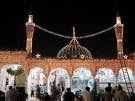Data Darbar (or Durbar), located in the city of Lahore, Pakistan is one of the oldest Muslim shrines in the sub-continent. It houses the remains of a Sufi saint, Abul Hassan Ali Hajvery (more commonly known as Daata Ganj Baksh, meaning the master who bestows treasures). He is said to have lived on the site in the 11th Century.
The shrine is located near the Bhaati Gate into Lahore's Walled City. It was originally built by the Ghaznavi king Sultan Zakiruddin Ibrahim in the late 11th century, and has been expanded several times. There have been rising security fears in recent years after threats by Pakistan's Taliban militants. The large size of the complex which houses the shrine and the fact that it is open at all hours to the public makes protecting it extremely difficult. For centuries his tomb was visited by Muslims and Hindus in search of his blessings but since partition, most visitors have been Muslim, although people of all religions are welcome. Pakistani politician Nawaz Sharif is a frequent visitor. On special occasions, the shrine is decorated with lights, dinner is prepared for hundreds of people and visitors dance while musicians play Sufi music for hours. At the boundary of the shrine, Muslims recite the Qur'an, and pay tributes to Muhammad.
The shrine is located near the Bhaati Gate into Lahore's Walled City. It was originally built by the Ghaznavi king Sultan Zakiruddin Ibrahim in the late 11th century, and has been expanded several times. There have been rising security fears in recent years after threats by Pakistan's Taliban militants. The large size of the complex which houses the shrine and the fact that it is open at all hours to the public makes protecting it extremely difficult. For centuries his tomb was visited by Muslims and Hindus in search of his blessings but since partition, most visitors have been Muslim, although people of all religions are welcome. Pakistani politician Nawaz Sharif is a frequent visitor. On special occasions, the shrine is decorated with lights, dinner is prepared for hundreds of people and visitors dance while musicians play Sufi music for hours. At the boundary of the shrine, Muslims recite the Qur'an, and pay tributes to Muhammad.






No comments:
Post a Comment